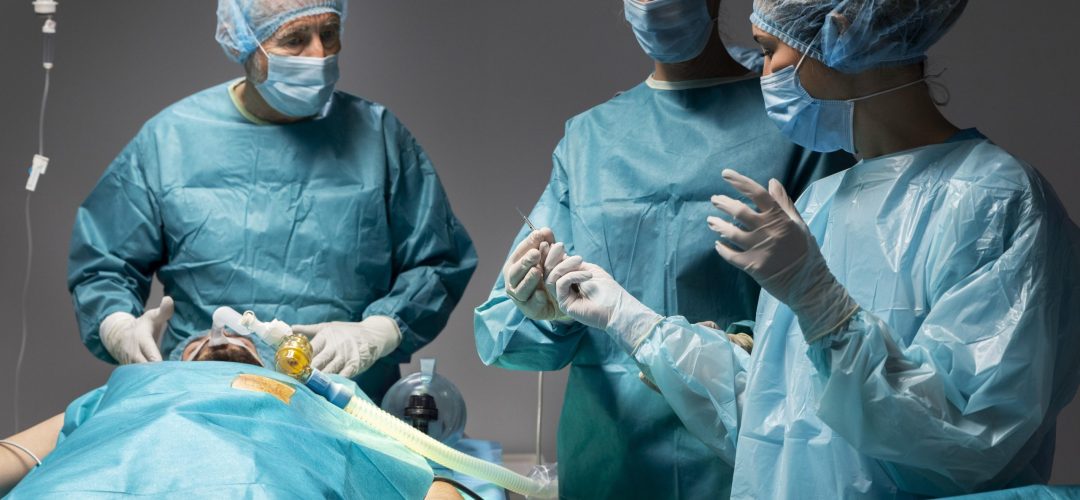Anaesthesiology

The Postgraduate Diploma (PGD) in Anaesthesiology is a specialized and comprehensive program designed for healthcare professionals seeking advanced knowledge and skills in the field of anesthesia. This rigorous postgraduate course is tailored to provide participants with an in-depth understanding of the principles, practices, and techniques related to anesthesia administration and perioperative care. Throughout the program, participants delve into the physiological and pharmacological aspects of anesthesia, gaining expertise in pain management, airway management, and perioperative assessment. The curriculum encompasses a wide range of topics, including regional anesthesia, critical care aspects, and the use of advanced technologies in anesthesia practice. Emphasizing both theoretical learning and practical skills, the PGD in Anaesthesiology includes clinical rotations, hands-on training in anesthesia techniques, and exposure to diverse surgical procedures. Participants develop proficiency in administering various types of anesthesia, including general, regional, and local anesthesia.
- Physiological and Pharmacological Expertise: Explore the physiological and pharmacological facets of anesthesia, acquiring advanced knowledge in areas such as pain management, airway control, and perioperative assessment.
- Specialized Skills in Pain Management: Develop specialized proficiency in pain management, facilitating effective evaluation and relief of acute and chronic pain conditions through diverse anesthesia interventions.
- Proficiency in Airway Management: Achieve expertise in airway management techniques to ensure the secure and optimal delivery of anesthesia in varied clinical scenarios.
- In-Depth Understanding of Perioperative Assessment: Cultivate a comprehensive understanding of perioperative assessment, incorporating considerations for patient safety and well-being throughout the entire surgical process.
- Wide-Ranging Curriculum: Engage with a diverse curriculum that encompasses an array of topics, including regional anesthesia, critical care components, and the integration of advanced technologies in anesthesia practice.
- Hands-On Clinical Experience: Acquire practical experience through clinical rotations, hands-on training in anesthesia techniques, and exposure to a range of surgical procedures, enhancing practical skills and decision-making abilities.
- Expertise in Various Anesthesia Types: Build proficiency in administering diverse anesthesia types, including general, regional, and local anesthesia, ensuring adaptability in anesthesia practice.
- Multidisciplinary Collaboration: Promote effective collaboration with healthcare professionals from diverse disciplines, acknowledging the significance of interdisciplinary teamwork in perioperative care.
- Ethical and Professional Practice: Instill a robust sense of ethical responsibility, emphasizing patient safety, confidentiality, and professionalism in the execution of anesthesia.
- Research Engagement: Promote active involvement in research pursuits, stay updated on the latest developments in anesthesia research, and contribute to the progression of knowledge in the field.
Upon completing the PGD in Anaesthesiology, participants will possess the knowledge, skills, and ethical foundation essential for excelling in the specialized realm of anesthesia, ensuring secure and efficient perioperative care for patients undergoing various medical interventions.
The completion of a Postgraduate Diploma in Anaesthesiology opens a range of career possibilities. Graduates may thrive as Anesthetists, skillfully administering secure and efficient anesthesia during surgical procedures. Expertise in Pain Management enables professionals to address a variety of pain conditions. Critical Care Anesthetists contribute their skills in intensive care environments. Perioperative Care Coordinators ensure seamless surgical experiences. Opportunities span healthcare administration, research positions, and involvement in global health initiatives. Quality Assurance Officers maintain standards, while telemedicine provides avenues for remote anesthesia consultations. Career trajectories encompass medical simulation, pharmaceutical roles, health policy advising, and veterinary anesthesia. The PGD prepares professionals for impactful roles across diverse healthcare settings.
Course Details

Course Overview:
The PGD in Anaesthesiology is a focused program for healthcare professionals, providing advanced knowledge and skills in anesthesia. Delving into anesthesia principles and practices, participants gain expertise in pain management, airway control, and perioperative assessment. The curriculum covers topics like regional anesthesia, critical care considerations, and advanced technologies. Emphasizing both theory and practical application, the program includes clinical rotations and hands-on training in diverse surgical procedures. Participants develop proficiency in administering various anesthesia types, ensuring adaptability. With a commitment to ethical practice, interdisciplinary collaboration, and research engagement, the PGD prepares professionals for impactful roles as adept anesthetists in diverse healthcare settings.
Equivalences:
The Level 7-Post Graduate Diploma in Anaesthesiology is equivalent to a master’s degree or postgraduate diploma. It represents an advanced level of expertise in Anaesthesiology , allowing students to demonstrate mastery in the field. The diploma is recognized by various professional bodies and institutions within the healthcare sector.
Course Contents:
The course content of the Level 7-Post Graduate Diploma in Anaesthesiology typically covers a range of advanced topics. Here are the topics covered:
- Introduction to Anaesthesia
- Introduction to Critical Care
- Gynecology and Obstetrics
- Pain Management
- General Surgery
- Regional Anaesthesia
- Urology, Radiology & Imaging
- ICU & post Anaesthesia care
- Orthopaedics and Trauma
- Consolidating Basic Clinical Practice
Assignment Criteria:
The qualification assessment criteria are based on assignments, but in order to pass, the learner must complete all of the unit’s learning requirements. At the completion of each unit, an interview will be held as proof that the work truly belongs to the learner.
Entry Requirements:
The specific entry requirements for the Level 7-Post Graduate Diploma in Anaesthesiology include:
- A minimum age requirement (e.g., 22 years old)
- A complete Bachelor’s degree, UK level 6 diploma in Anaesthesiology , health sciences or an equivalent overseas qualification.
- Completion of a MBBS degree or a related degree.
- English language proficiency, demonstrated through language tests or previous education in an English-speaking environment.
Course Duration:
The qualification has recommended course duration of 2 years.
Note: However, the course duration may be increased to meet additional learning needs if required.

